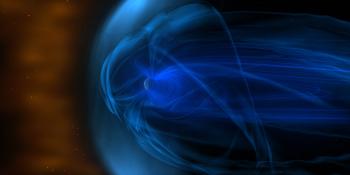Viewing archive of Monday, 23 April 2012
Solar activity report
Any mentioned solar flare in this report has a scaling factor applied by the Space Weather Prediction Center (SWPC). Because of the SWPC scaling factor, solar flares are reported as 42% smaller than for the science quality data. The scaling factor has been removed from our archived solar flare data to reflect the true physical units.
Report of Solar-Geophysical Activity 2012 Apr 23 2200 UTCPrepared by the NOAA © SWPC and processed by SpaceWeatherLive.com
Joint USAF/NOAA Report of Solar and Geophysical Activity
SDF Number 114 Issued at 2200Z on 23 Apr 2012IA. Analysis of Solar Active Regions and Activity from 22-2100Z to 23-2100Z
Solar activity has been at low levels for the past 24
hours. There are currently 8 active regions on the disk, with 5
regions having sunspots. The spotted regions on the disk all
remained rather quiet and stable throughout the period. However,
around plage Region 1461 (N10W19), two C-class events were observed
today with associated Earth directed CMEs.
IB. Solar Activity Forecast
Solar activity is expected to be at
low levels with a chance for M-class x-ray events for the next three
days (24 - 26 April).
IIA. Geophysical Activity Summary 22-2100Z to 23-2100Z
The geomagnetic field has been at quiet to minor storm levels for the
past 24 hours. Observations made by the ACE spacecraft, around
23/0200Z, indicated the arrival of a CME that lifted off the solar
disk on 19 April. Solar wind velocities increased from 350 - 400
km/s with the total IMF reaching around 18 nT. The Boulder
magnetometer measured a 31 nT sudden impulse at 23/0325Z in
conjunction with the CME arrival here at Earth. From then on, active
to minor storm levels were observed due to multiple periods of
sustained negative Bz.
IIB. Geophysical Activity Forecast
The geomagnetic field is
expected to be at quiet to active levels with a slight chance for a
minor storm on day 1 (24 April) as effects from the CME wane and a
coronal hole high speed stream (CH HSS) moves in. Quiet to active
levels are expected on day two (25 April) as the effects of the CH
HSS continue. An increase to quiet to minor storm levels are
expected on day three (26 April) as the two CMEs, observed earlier
in the period, are expected to become geoeffective.
III. Event Probabilities 24 Apr to 26 Apr
| Class M | 30% | 30% | 30% |
| Class X | 01% | 01% | 01% |
| Proton | 01% | 01% | 01% |
| PCAF | green | ||
IV. Penticton 10.7 cm Flux
Observed 23 Apr 142 Predicted 24 Apr-26 Apr 140/140/135 90 Day Mean 23 Apr 112
V. Geomagnetic A Indices
Observed Afr/Ap 22 Apr 007/008 Estimated Afr/Ap 23 Apr 016/025 Predicted Afr/Ap 24 Apr-26 Apr 012/018-008/012-011/018
VI. Geomagnetic Activity Probabilities 24 Apr to 26 Apr
| A. Middle Latitudes | |||
|---|---|---|---|
| Active | 40% | 25% | 40% |
| Minor storm | 15% | 05% | 15% |
| Major-severe storm | 01% | 01% | 01% |
| B. High Latitudes | |||
|---|---|---|---|
| Active | 50% | 40% | 50% |
| Minor storm | 30% | 20% | 30% |
| Major-severe storm | 10% | 05% | 10% |
All times in UTC
Latest news
Latest forum messages
AR 14079 70Unspecified geomagnetic activity 2384Short PBS episode on Aurora sounds 6Power transmission for all of us. And why I believe we are better prepared than ever for major solar events 33New satellites - Proba-3, PUNCH, SWFO-L1, GOES-U/19 54
More topicsSupport SpaceWeatherLive.com!
A lot of people come to SpaceWeatherLive to follow the Sun's activity or if there is aurora to be seen, but with more traffic comes higher server costs. Consider a donation if you enjoy SpaceWeatherLive so we can keep the website online!

Space weather facts
| Last X-flare | 2025/03/28 | X1.1 |
| Last M-flare | 2025/04/30 | M2.03 |
| Last geomagnetic storm | 2025/05/02 | Kp5+ (G1) |
| Spotless days | |
|---|---|
| Last spotless day | 2022/06/08 |
| Monthly mean Sunspot Number | |
|---|---|
| April 2025 | 140.6 +6.4 |
| May 2025 | 48.5 -92.1 |
| Last 30 days | 116.9 -13.6 |


